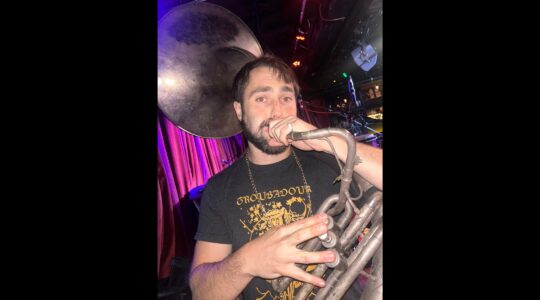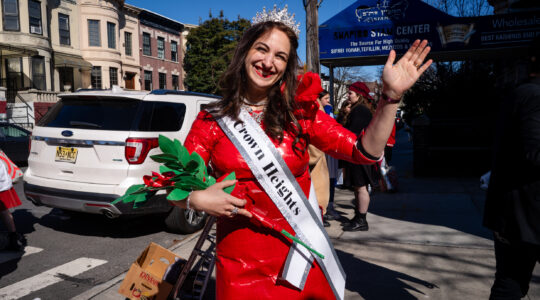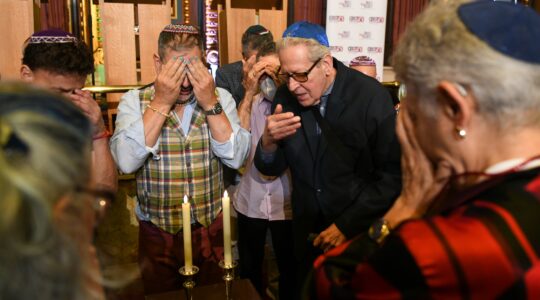Dreadlocks are a popular hairstyle among vinyl-spinning deejays. Kipas in this crowd are rare. Aaron Bisman wears both.
The 22-year-old New York University graduate is scheming to make dreadlocks with skullcaps a more widespread phenomenon. When he’s not at the turntables, promoting artists at Ropeadope Records or teaching Hebrew school to seventh-graders, Bisman is cranking out plans for JDub Records, a non-profit Jewish music label he’s starting with a former NYU classmate and fellow musician, Ben Hesse.
JDub takes its name in part from a Jamaican musical genre that consists mainly of instrumental remixes. The idea for JDub records is to produce music with Jewish content but composed in contemporary styles: reggae, hip-hop, alt-folk, punk, jazz-fusion, jungle and drum ‘n bass.
Since August, however, Bisman has been making more somber plans as well. On July 31, two of his friends, Ben Blutstein and Marla Bennett, were killed in the bombing at Hebrew University. The three had met last year as students at the Pardes Institute of Jewish Studies, a non-denominational, egalitarian religious institution in Jerusalem. Mr. Blutstein, 25, and Ms. Bennett, 24, were enrolled in the Pardes Educators Program when they were murdered. In their memory, Bisman has organized a concert titled Zachor, Hebrew for "remember."
The Dec. 8 event features performances by Hasidic New Wave, one of Frank London’s bands; Yakar Rhythms, a Senegalese hand-drumming corps; Pharaoh’s Daughter, Basya Schechter’s Middle Eastern-tinged ensemble; and Baba Israel, a beat-box artist, rapper and poet. In keeping with the JDub ethos, the event is happening at the Knitting Factory, a downtown club known for cutting-edge music.
"It was always in my head: "This is what Ben and I would have done, and this is what Marla would have come to," Bisman told The Jewish Week on a recent evening after Hebrew school.
Mr. Blutstein, of Susquehanna Township, Pa., was a top-level Talmud student at Pardes who wore a beard, kipa and earrings, Bisman said. He was a percussionist and well-known deejay in Jerusalem and Tel Aviv who often called himself "Benny the B, the DJ Dati," using the Hebrew word for "religious."
The two became friends while Bisman, who had lugged his own turntables to Israel for his junior year, was spinning disks at a party. Eventually the two spun records together, notably at a massive musical event that according to Bisman brought dozens of rappers to microphone, including "Purple 59," a Jew from Jerusalem, and "TN," an Israeli Arab from Lod.
Ms. Bennett, of San Diego, is remembered for her zest for life, seemingly boundless affection, perennial smile and beautiful voice. "I fell in with Marla and her friends," said Bisman, who was permanently adopted by Ms. Bennett’s circle.
Bisman said he conceived of the concert idea at Mr. Blutstein’s funeral in Pennsylvania. Three days later, at Ms. Bennett’s funeral in California, Bisman approached Pardes Institute’s director, Rabbi Daniel Landes, with the idea of an event to benefit the Marla Bennett and Ben Blutstein Memorial Scholarship Funds, which had been set up following the bombing.
"I leaped at it," Rabbi Landes recalled. "For both [Marla and Ben], music was crucial, a major part of their souls."
The son of a rabbi and a lawyer from Arizona, Bisman has solid experience producing music events. At college, he and Hesse created the Eclectic Youth Powerhouse, monthly performances of student bands and poets, sponsored and hosted by Hillel at NYU. The Powerhouse, now entering its third incarnation, brings diverse crowds of students and professors to the Bronfman Center for Jewish Life on East 10th Street.
With JDub, Bisman is hoping to attract young music fans with mainstream tastes to Jewish sounds. He and Hesse have applied for one of eight Joshua Venture Fellowships, which will be announced next week. The fellowships, awarded every two years, provide entrepreneurs in their 20s and 30s with $60,000, advice and technical assistance.
If Bisman’s application is successful, JDub will join the ranks of current fellowship ventures, like Heeb magazine, the New Jewish Filmmaker Project and The Hub, a performing arts program at the JCC in San Francisco.
Bisman sees JDub and its future artists as "taking ownership of Jewish culture."
Contemporary Jewish music (from singer-songwriter Debbie Friedman to Broadway vocalist Dudu Fisher and even avant-garde jazzman John Zorn) are not his generation’s style, Bisman says. "There’s nothing out there people feel they can hold on to."
JDub already has a handful of projects cooking, all promising "not just new Jewish sounds but new musical sounds" for Jewish and non-Jewish audiences alike, Bisman says. "Mass appeal is the idea."
Zachor takes place at the Knitting Factory, 74 Leonard St., Manhattan, (212) 219-3055. Sun., Dec. 8, 7 p.m. $20.
The New York Jewish Week brings you the stories behind the headlines, keeping you connected to Jewish life in New York. Help sustain the reporting you trust by donating today.




